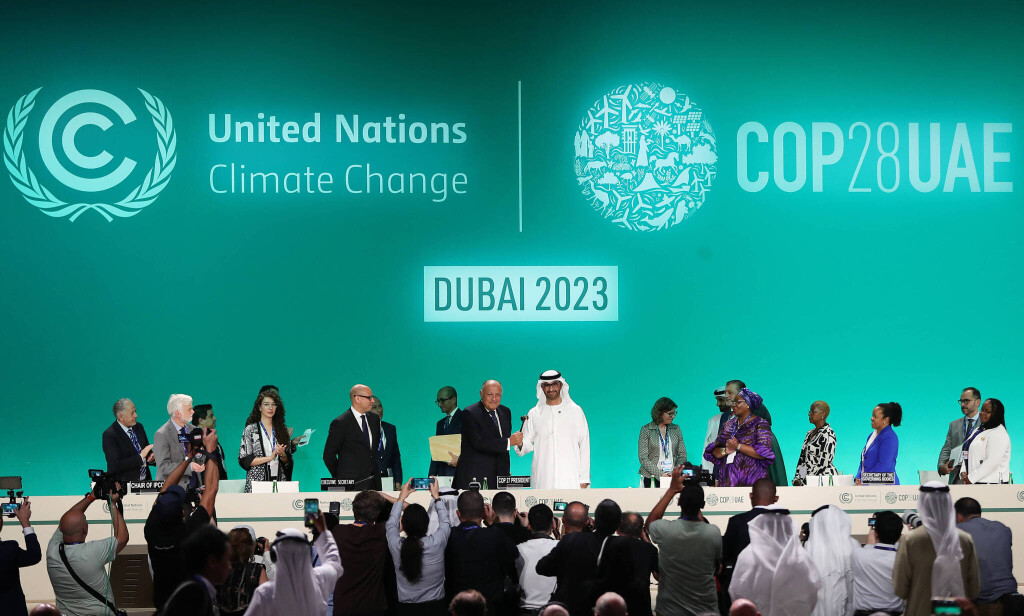The double success at the start – and its risks

COP28 in Dubai started with an unprecedented victory: The new loss and damage fund has been set up, around 400 million dollars have been made available, and the agenda has been approved. On the one hand, this is a positive signal for the conference. On the other hand, it could slow down the Presidency's vigor.
The COP28 presidency kicked off the first day of the conference with a strategically important double win. In a surprise move, the opening plenary session on Thursday afternoon adopted the long-disputed details for the loss and damage fund (LDF) and the conference agenda. At the same time, several countries, led by the UAE and Germany, declared their willingness to fill the LDF with a total of around 400 million dollars.
The "bang," as David Ryfisch from the development organization Germanwatch called the early result, gives the often bitter and frustrating conference process a positive tone for now. This means that the strategy of the team headed by the COP's chief organizer, Sultan Al Jaber, who was officially elected president of the conference yesterday, has been a success so far:
Resolving disputes behind the scenes with all parties involved as early as possible,
encouraging the countries to work efficiently,
bundling all contentious issues into one big final decision
and utilizing the UAE's political and financial resources to set this course.
The deal: UAE and Germany lead the way
The first rumors about the Presidency's "double whammy" had already been circulating the day before. Participants reported that the decision on the loss and damage fund and its financing, in particular, had only been made on the evening before and the morning of the conference. "A lot of phone calls were made before everything was clear," they said. The deal was also paved by the visit of State Secretary for Development Jochen Flasbarth to Abu Dhabi in October.
In the process, according to the delegation, it became clear from the outset that Germany and the UAE were both very interested in good news. The UAE was keen to get its prestigious conference off to a positive start. With almost 100,000 participants, it is set to be the largest climate COP ever. Germany had a strong interest in the UAE, which is not considered a developed country according to UN criteria, becoming the first country in the history of the UN Climate Convention to contribute to a UN climate finance pot. Until now, it was strictly assumed that this was the exclusive responsibility of developed countries.
Who has promised how much so far
This is why the first plenary session of COP28 also became a small donor round for the LDF. The fund, which will be managed by the World Bank, requires at least 200 million dollars as start-up capital. By Thursday evening, the following pledges had been made:
100 million US dollars from the United Arab Emirates.
100 million dollars from Germany, approved by the Federal Cabinet and the government coalition, have already been booked in the 2024 budget.
In addition to Germany, "at least another 136 million dollars" from "Team Europe," wrote EU Climate Commissioner Wopke Hoekstra.
"Up to 60 million pounds" for loss and damage, equivalent to around 75 million dollars, with 40 million pounds for the LDF.
10 million US dollars from Japan.
17.5 million from the United States plus 7 million for two funds for climate damage in the Pacific and the "Santiago" network on loss and damage. However, Congress still has to approve the US money.
No disputes over the agenda
In parallel, the COP plenary also adopted the agenda of the meeting. What sounds unremarkable is actually a significant step forward. Many conferences in the past had been paralyzed by days-long "agenda fights" at which individual agenda items were so hotly debated that progress was prevented elsewhere. As recently as June, the SBSTA58 interim conference in Bonn spent practically the entire time negotiating without a proper agenda.
The start of COP28 also saw a number of controversial motions, particularly from developing countries, which demanded individual new agenda items: Faster carbon reduction, the responsibilities of developed countries, adaptation or financing. COP President Al Jaber "solved" the problem by assuring them that their concerns would be discussed under existing agenda items or by forming their own negotiating groups. However, this only delays the problems. Because there will probably only be one big, all-encompassing COP decision at the end of the conference – on the Global Stocktake – these issues will then resurface there. And they could dilute or jeopardize a large, comprehensive COP declaration.
Risk: resting on laurels
Veteran negotiators fear that early success could backfire in other ways: If the Presidency rests on its laurels. Al Jaber has scored a significant victory with the implementation of the LDF, especially for the newly industrialized and developing countries. But the issues of phasing out fossil fuels, expanding renewables and a new global financial order are far more controversial. If Al Jaber's team does not commit as much political capital to these issues, they could end up as non-binding declarations and promises. Germany's State Secretary and Special Envoy for International Climate Action, Jennifer Morgan, who has intensively campaigned for the LDF both in front of and behind the scenes, once again called yesterday for " decisions, not declarations " on these issues at the conclusion of the COP.
Heads of government under pressure
In any case, the COP's quick decision on the LDF and its financing will put pressure on the heads of state and government arriving in Dubai on Friday and Saturday. At the Climate Action Summit, they will each have three minutes to present themselves as climate champions. The COP Presidency and the climate action community see this as the perfect opportunity to put money on the table for the LDF.
Click here for all previously published articles on COP28.
Letzte Aktualisierung: 24. Juli 2025

